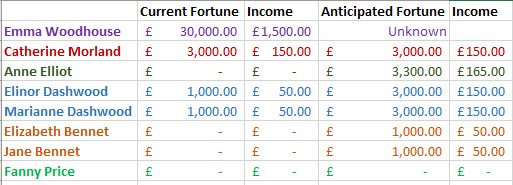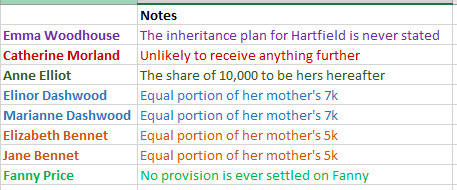#but also Jane Austen if we count Maria Bertram
Text
I hate it when the female lead has a perfectly good fiance/boyfriend and then she just leaves him randomly, occasionally at the altar, because this new guy is "true love"
I also hate it when they give the fiance/boyfriend huge red flags but the female lead doesn't leave until she's secured "true love"
Maybe what I really hate is emotional (and let's face it often physical) affairs...
#sweet home alabama#poor Patrick Dempsey just left at the altar#the notebook#I am sure there are more#tropes we hate#not jane austen#but also Jane Austen if we count Maria Bertram#she was trying to do this#made of honor#liar liar#I could probably think of more if I tried#If you like Grey's anatomy in Made of Honor the girl leaves Army Surgeon at the altar for Neurosurgeon
232 notes
·
View notes
Text
Jane Austen Charted #15
How Wealthy are the Jane Austen Heroines?
(This turned into a long post)
Women in Jane Austen’s novels have two kinds of wealth, fortunes which seem to be guaranteed to already accompany them into marriage, like Emma’s 30k or Elinor & Marianne Dashwoods’ 1k which they have already received from their uncle, and then eventual inheritance, like Elizabeth’s 1k that she will receive after the death of both of her parents. Here are the sums:

And the explanation of each amount:

Anne Elliot’s amount is disputed because of how the text is worded, she is either getting 10,000 or 1/3 of that amount. Here is the quote: who could give his daughter at present but a small part of the share of ten thousand pounds which must be hers hereafter. (Ch 24) It will be paid upon her father’s death.
As to the amount, I usually think it’s 1/3 of 10k. Knowing Sir Walter’s character, and that his wife was not a trade heiress but the daughter of a country gentleman, I think Lady Elliot’s dowry being ten thousand, and Sir Walter never adding to it seems pretty likely. He probably assumed that his children would marry well based on beauty and rank alone.
As for Emma, we don’t know what is going to happen to Hartfield. The fact that John Knightley has a job and isn’t just living off Isabella’s fortune until they inherit makes me think it might be going to Emma (as opposed to how Mary and Charles Musgrove are living), but that is speculation and may also be based in a difference in personality. It is equally possible that the plan was for Spinster Emma to live there with John and Isabella. Also, Emma is counting on her sister’s eldest son to inherit Donwell, not Hartfield, which is another clue that it’s going to Emma, not Isabella.
It seems to me that the best marriage prospects would be those who have a fortune now, not when their parents die. Certainly with men, those who are the most eligible have already come into their fortunes.
Also, the Dashwoods and Anne Elliot are in a far safer financial position if their remaining parent dies, as they have a decent, though not large income on their own. The three Dashwood sisters could continue to live at Barton cottage and maintain themselves if they worked together.
So how do the heroines compare to other ladies:

The richest two women are Anne de Bourgh, who will inherit Rosings, and Sophia Grey, the future Mrs. Willoughby. Given that Mrs. Jennings, who is from trade, knows Sophia’s relations, we can assume that Sophia is a trade heiress. Depending on what Emma Woodhouse receives when her father dies, she may be as wealthy as both of them.
From the novels, the breakdown of fortune attractiveness:
Nothing - Nothing is bad. However, I have a strong suspicion that this can mean actually nothing or something like Jane Fairfax with a few hundred pounds. Lucy Steele and Isabella Thorpe probably have actually nothing, but I doubt Mary Crawford when she says her friend who married a peer actually had zero pounds to her name. Miss Ross probably had nothing in comparison to Mary.
£1000 - Pretty much as bad as nothing. This isn’t enough for someone to maintain themselves in gentility. The Bennet sisters could pool their money and maybe be okay with their combined £250.
£3000 - Interesting that so many heroines have this amount. It seems like it’s a decent, but not great dowry. Respectable.
£10,000 - This number comes up A LOT in Jane Austen’s novels. We are told in Mansfield Park: Miss Maria Ward, of Huntingdon, with only seven thousand pounds, had the good luck to captivate Sir Thomas Bertram, of Mansfield Park... her uncle, the lawyer, himself, allowed her to be at least three thousand pounds short of any equitable claim to it. From this statement and context from the other novels, 10k seems like the basic “good” fortune. Minimum entry to expect an eldest son match.
£20,000 - This is a big fortune, go after a Mr. Darcy or a Tom Bertram the future baronet kind of money. I don’t get the impression that either Caroline Bingley or Mary Crawford are supposed to be seen as delusional for thinking they can marry where they aim for. It’s more about the guy not liking them than unrealistic expectations.
£30,000 + Filthy rich
Also, I really wish we knew more fortune numbers! What did Lady Middleton and Mrs. Palmer have? What was an acceptable dowry for a Miss Bertram? (my guess is at least 10k) What did Charlotte Lucas have? (I suspect not much better than Elizabeth, if not worse)
#I might have forgotten someone but those are all the exact numbers I can remember#and the tags#oh the tags#elizabeth bennet#jane bennet#jane austen#catherine morland#fanny price#elinor dashwood#marianne dashwood#emma woodhouse#anne elliot#mansfield park#sense and sensibility#pride and prejudice#northanger abbey#emma#persuasion#I bet the persuasion tag is useless#me counting the books to make sure I didn't forget one#jane austen charted#so many charts!#literature mixed with numbers#sophia grey#anne de bourgh
159 notes
·
View notes
Text
Why is the play wrong in Mansfield Park?
We know that Jane Austen wrote and acted in home theatre productions herself, so why is it so bad that Tom and Yates want to put on a play in Mansfield Park?
They have chosen almost as bad a play as they could
1. It’s about the play they chose. Lovers’ Vows features a fallen woman, Agatha, who had a child out of wedlock. The first act also involves a lot of touching between Agatha and Frederick (her natural son). Amelia, who was toned down from the German version, declares her love for a man before he does, which was seen as very vulgar. Even the bold Mary Crawford struggles with Amelia’s lines! And the Count is also sexually immoral, which is discussed.
It would shew great want of feeling on my father’s account, absent as he is, and in some degree of constant danger
2. It’s about Sir Thomas being in danger. And you may wonder, do we need to have no fun whenever someone is at sea? Maybe? We see in the society that Jane Austen writes about a lot of performative mourning. Someone you barely know dies and you wear black ribbons and don’t get engaged for a while. So it’s not like you can’t have fun when the head of your family is possibly being attacked by pirates, but maybe don’t publically put on a play. They also use Sir Thomas’s study while he is away.
it would be imprudent, I think, with regard to Maria, whose situation is a very delicate one, considering everything, extremely delicate.
3. It’s about Maria being engaged (but not acting opposite to her fiance.) The first thing Maria does is secure herself as Agatha so she can get touchy-feely with Henry Crawford. This may put her engagement in danger. That is her goal, but as a concerned brother Edmund is trying to help her avoid it.
His sense of decorum is strict.
4. It’s about Sir Thomas being strict. Edmund points out that while acting may be okay for other families, his father would not approve of it. Not all Regency families are the same, like today, some are more strict and worried about propriety. The Bertrams are on the far side of conservative, while the Crawfords and Yates’s families are on the lassie-faire side.
The innovation, if not wrong as an innovation, will be wrong as an expense.
5. It’s about Tom wasting money while they are in financial difficulties. Dude hired a scene painter! That cannot be cheap!
This is the end of all the privacy and propriety which was talked about at first.
6. It’s about the publicity. Edmund joins the play to keep a third family from being included in the production, but Tom keeps inviting everyone to come and see them act. If Sir Thomas wouldn’t want his adult daughters to act at all, then he definitely wouldn’t want them acting in front of the whole neighbourhood. In an era where the rich are supposed to showing the way in morality, this is not a good look for the baronet’s children.
“I know all that,” said Tom, displeased. “I know my father as well as you do; and I’ll take care that his daughters do nothing to distress him. Manage your own concerns, Edmund, and I’ll take care of the rest of the family.”
7. It’s about Tom acting like he’s already in charge. By dismissing the cares of his father and acting against his known wishes, Tom acts as a usurper of his father’s power instead of a dutiful son.
So it’s not just acting, its the play the picked, it’s not all families, it’s this family, it’s not just this family, it’s this time and these conditions.
#mansfield park#jane austen#the play#lovers vows#also everyone is being incredibly selfish the entire time#Maria is delighting in defeating Julia#Tom and Maria drag Edmund down to their level and then are excited about it#It's not just the acting thing
167 notes
·
View notes